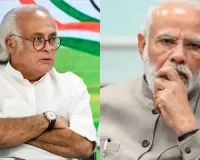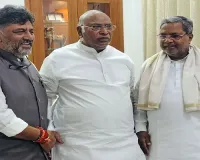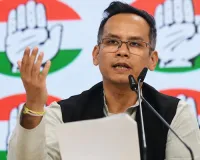Vain and preposterous: India on China renaming places in Arunachal Pradesh
Vain and preposterous

India on Wednesday outrightly rejected as "vain and preposterous" China renaming some places in Arunachal Pradesh and said such attempts will not alter the
India on Wednesday outrightly rejected as "vain and preposterous" China renaming some places in Arunachal Pradesh and said such attempts will not alter the "undeniable" reality that the state "was, is, and will" always remain an integral part of India.
New Delhi's reaction came in response to Beijing announcing Chinese names for some places in Arunachal Pradesh, which the neighbouring country claims as the southern part of Tibet.
"We have noticed that China has persisted with its vain and preposterous attempts to name places in the Indian state of Arunachal Pradesh," External Affairs Ministry Spokesperson Randhir Jaiswal said.
"Consistent with our principled position, we reject such attempts categorically," he said.
Jaiswal was responding to a media query on the issue.
"Creative naming will not alter the undeniable reality that Arunachal Pradesh was, is, and will always remain an integral and inalienable part of India," he said.
In April last year too, India had reacted sharply when Beijing released a list of standardised names of 30 places in Arunachal Pradesh.
The Chinese Civil Affairs Ministry released the first list of the standardised names of six places in Zangnan in 2017, while the second list of 15 places was issued in 2021 followed by another list with names for 11 places in 2023.
China's release of the new list of names of places in Arunachal Pradesh comes amid efforts by the two countries to normalise ties hit by the eastern Ladakh border standoff.
After a gap of nearly five years, India and China last month decided to resume the Kailash Mansarovar Yatra, a move that was seen as an attempt to repair the relationship.
The Kailash Mansarovar Yatra was suspended initially in 2020 because of the COVID-19 pandemic and subsequently because of the military standoff between the two sides along the Line of Actual Control (LAC) in eastern Ladakh.
The militaries of India and China completed disengagement of troops at the two remaining friction points of Demchok and Depsang under a pact sealed on October 21 last year.
Two days later, Prime Minister Narendra Modi and Chinese President Xi Jinping held talks in the Russian city of Kazan and agreed to revive various bilateral dialogue mechanisms.
Following the Modi-Xi talks, the two sides held a series of meetings in the last few months which were aimed at normalising the bilateral relations.









